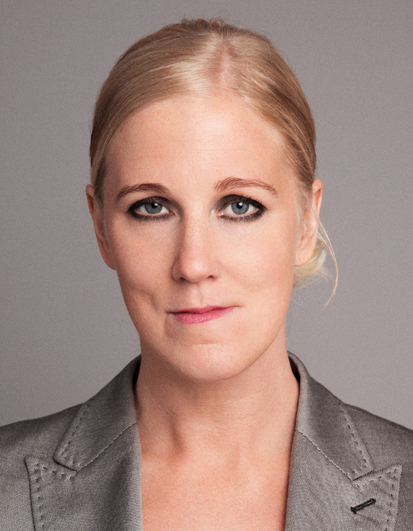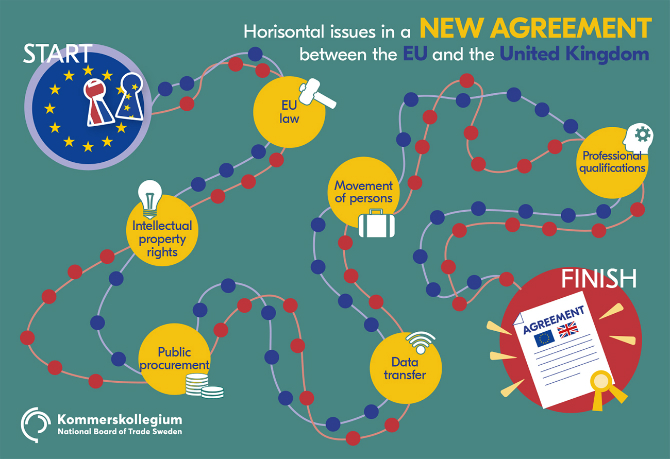 From where the Swedes are looking there is no perfect Brexit agreement, writes Anna Stellinger (NBT). She lays out the priorities that the National Board of Trade (a Swedish expert agency) suggest for the upcoming negotiations, which are largely about mitigating its negative effects of Brexit rather than any potential benefits.
From where the Swedes are looking there is no perfect Brexit agreement, writes Anna Stellinger (NBT). She lays out the priorities that the National Board of Trade (a Swedish expert agency) suggest for the upcoming negotiations, which are largely about mitigating its negative effects of Brexit rather than any potential benefits.
Sweden has all the reasons in the world to be worried about Brexit. Sweden will be losing its closest European ally, like-minded in many issues stretching from the need to decrease the common agriculture budget, to a firm conviction that the future of Europe’s competitiveness lies in free trade with the world outside the EU.
But the real concern for Sweden, as the United Kingdom is about to step out of the Union, is economic. The UK is one of Sweden’s most important trading partners, both for imports and exports, in goods as well as services. Most British consumers can name at least a few Swedish companies, whether it’s H&M, Ericsson, Spotify or IKEA. Trade between Sweden and UK is frictionless today – in principle, the UK is considered as a safe and highly attractive “home market” for Swedish companies. And vice versa.
However, the UK is leaving the EU. As the negotiations on the future relationship between the EU and UK are about to start in Brussels, the Swedish Government has commissioned the National Board of Trade to identify which sectors are particularly important for Sweden. In the past three months, our staff of experts on the EU internal market and international trade compiled a broad and deep 350-page analysis regarding the ways in which Brexit will be most detrimental to trade between our countries and how its negative effects can be mitigated. Our report is however not limited to just what the government asked us to investigate. Of course, there are particularly vulnerable sectors in the Sweden-UK trade, but we have highlighted a range of broader, horizontal issues that are crucial for the future trading relationship.

When the UK leaves the EU, international trade rules established under the auspices of the World Trade Organisation will be critical, at least in a non-agreement situation. The WTO rules are not as comprehensive as the EU Internal Market rules. This may, at least in the long run, give rise to extensive regulatory divergence, and increase costs for Swedish businesses. The risk alone, of rules and regulations drifting apart, is sufficient to produce a negative effect on trade between our countries.
In defining the sectors of special interest to Sweden in the upcoming Brexit negotiations, we have chosen sectors (1) of great importance to Sweden’s trade with the UK (imports and exports) and (2) where Brexit might lead to significant trade barriers. Other determining aspects are where the added value is created and how many jobs in Sweden are supported by trade in the different sectors.
We conclude that two specific sectors need to be in focus: motor vehicles and business services. Motor vehicles is a sector with detailed technical regulations and potentially high tariffs in a Brexit with no agreement. Some sort of solution, such as the ones already created for Switzerland, Japan and South Korea, may be needed to avoid serious trade barriers. Sector-specific solutions are not very useful when it comes to business services, except for certain professions. Horizontal rules covering areas such as movement of persons and data are important to all sectors, but they are particularly important to the business services sector.
The risks posed by Brexit seem, on the other hand, to be relatively limited in some of the sectors/areas where Sweden has particular interests (mineral oils, paper, iron and steel, protection of intellectual property and retail). This means that the applicable regulatory frameworks do not appear to create significant problems to the sectors as a whole. Still, individual companies may suffer – especially if they deal with price-sensitive products. Even if trade in goods within these sectors would not be subject to higher tariffs, Brexit will still mean increased administration and requirements, such as customs formalities. This will increase costs for business.
But our main conclusion goes beyond what the Swedish government asked for. In our view, priority should be put to horizontal issues, such as movement of persons and data, tariff-free access with liberal rules of origin, trade facilitation, openness in public procurement and ways to assure compliance with agreed rules. These broad issues are necessary preconditions for all trade between Sweden and the UK after Brexit, in any sector – both for economic and for legal reasons.
Our key message is: yes, specific sectors may be more negatively impacted than others, but to limit the negative effects of Brexit we need to focus on finding solutions to the broader issues. When it becomes more difficult to move people and data and to deliver services or to trust that mutually agreed rules are actually followed – trade in general, regardless of sector, is challenged. As an expert agency not only on the EU internal market but also on the architecture and scope of free trade agreements in all forms, we would like to underline that without those fundamental building blocks that make up modern trade, the flow of goods and services across our borders will not function smoothly. This might seem obvious, but I believe that we need to repeat this regularly. 
So which model would be the most appropriate post Brexit? In this seemingly confusing debate on CETA +++ and other formulas, one needs to look at the facts. CETA is a truly ambitious free trade agreement when we start from zero, as was the case between Canada and EU. But when the starting point is full EU membership, CETA is really not at all ambitious or comprehensive. Far too many building blocks of trade are outside the scope of CETA. There would have to be many more pluses to CETA than three, to make up a suitable agreement between the EU and UK, at least if we would like Brexit to be the least distortive as possible.
There is not one single model for post-Brexit UK-EU relations that would be the best solution. From a strictly trade-focused perspective – elements from different models would be the best solution. From a Swedish perspective, the best solution would be for the UK to join the European Economic Area (EEA). This solution is, in most but not in all cases, the closest we get to maintaining status quo in EU-UK trade relations, and it would mitigate the negative effects of Brexit.
However, the EEA is not the best solution for all sectors and all issues that we have analysed. For example, the broad Deep and Comprehensive Free Trade Area (DCFTA) agreement signed with Ukraine is a better model for some sectors and issues, while in other cases a customs union such as that with Turkey may be more adequate – or for some problems posed by Brexit a solution with many partial agreements, such as that of Switzerland would be best. Likewise, a more traditional FTA will not solve all of the potential trade barriers that Brexit may lead to, regardless of whether we opt for an advanced and ambitious agreement, such as the one with Canada (CETA), or agreements such as those with Japan or South Korea. Such deals generally lack both harmonised rules and the principle of mutual recognition. This means that these agreements cannot be compared with today’s straightforward conditions for trade between Sweden (EU) and the UK. Our report offers no ready-made models or visions of a happy ending in this regard – for a free-trade-minded country like Sweden, Brexit is hardly good news.
This post represents the views of the author and not those of the Brexit blog, nor the LSE. The report “After Brexit – Recommendations for Swedish priorities in upcoming Negotiations” was launched on Friday 23, February 2018.
Anna Stellinger is the Director-General at the National Board of Trade Sweden (NBT) and Vice-Chair of the University Board at the University of Lund.







1 Comments